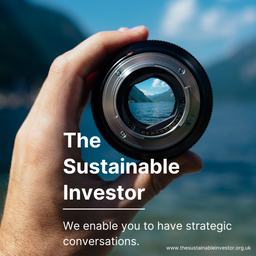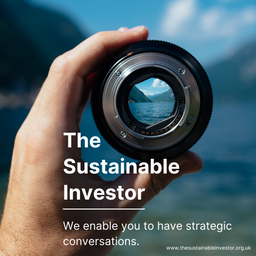
Sunday Brunch: the relevance of accounting for sustainability professionals?
Current financial reporting effectively ignores the investments that create the majority of a company's financial value - their intangible assets. This includes many environmental, social and governance factors. We need better disclosure on this, but how?
“Traditional financial numbers and statements do not even begin to reflect the most important resources of a 21st-century company - their intangible assets” Anup Srivastava, University of Calgary, and Shivaram Rajgopal, Columbia University.
Unless they have been living under a rock investors know that current financial reporting, using what is known as Generally Accepted Accounting Principles (GAAP), is becoming less and less useful as a tool to assist them in identifying a company's financial value. Yes, the reported (audited) financial results are a good starting point. But they need a lot of adjustment (ie work and analysis) to make them useful in our search for financial value.
What is less well understood is this weakness also impacts our desire to make the companies we are invested in more 'sustainable'. It's all to do with what assets the company gives us information on. The majority of most company's financial value comes from 'assets' that are not reported in the financial statements (specifically internally generated intangible assets such as human capital, intellectual property, systems and relationships).
Given this, how can we use the financial statements to link improved sustainability to financial value creation?
To me, this linking of sustainability issues and financial value creation is the future, and as such it's really important. We know that companies generally act if the change potentially delivers long term financial value. So, if we are to deliver on our sustainability objectives (both environmental and social), then we need to be able to show to companies that the action is not just the 'right thing to do', it also enhances their financial value. This could relate to opportunities for new or better products and services (potential upside). Or it could be about risk management, including new regulations (potential downside).
But, if companies don't include their most important value creation assets (internally created intangibles) in their financial reporting, this task is a lot harder (not impossible, but it requires much more work and analysis).
I (and many others) argue that trying to change the accounting reporting system will take way too long. The solution instead is to use the already existing ability of companies to report non standard measures, and to make narrative disclosure, to make the current system work better for us - as investors and sustainability professionals.
Current accounting reporting, for all of its weaknesses for both financial and sustainable investors, is still the only game in town. There is no real practical alternative. So we need to learn to work with the system (even as we seek to change it).
As investors it's not unreasonable to demand that companies disclose details of their investments in those assets that create financial value. We just have to ask the right questions. In this case it's about getting companies to better explain which assets (especially intangibles) they use to create the majority of their financial value, and then to explain how this works, how much they are investing in these assets, and how they are looking to enhance them in the longer term.
Regular readers will know that we call this strategy. And so basically what we want to understand is how the company's strategy generates financial value, using which assets. Plus how this contributes to improving its sustainability. Simple really !
Colleen Honigsberg, a Professor of Law at Stanford Law School, discussed this in detail in a recent paper published in a special edition ecgi blog on the 2024 Berkeley ECGI Corporate Governance Forum.
Dark Accounting matter - or the important things that financial reports don't disclose
Over the coming weeks I want to highlight how sustainability and financial value creation are linked. And why sustainability professionals need to care about how companies mostly think about sustainability issues: spoiler alert - they primarily have a financial value creation perspective.
Today I want to start with why some of the shortfalls in the financial data that companies report in their report & accounts etc matter. And more importantly, what we can do to bridge this shortfall.
This blog was prompted by a really good article/paper by Colleen Honigsberg, a Professor of Law at Stanford Law School. I really recommend that you read the full paper, as it sets out the arguments in much more detail than I can in this much shorter blog.

Financial reporting matters
Regular readers will know that I believe that financial reporting matters, not just for traditional investors, but also for sustainability professionals. The reason for this is simple - if we want companies to act on sustainability, we need to show a financial benefit.
One challenge (among many) is that the link between value creation and the financial data companies present in their annual (audited) report and accounts is getting weaker. This is not because financial data is getting less important. It's because what creates financial value is often not well covered in standard financial disclosures. Yes, I know this doesn't make sense but it's still true.
It's no secret that most financial analysts have to carry out a lot of adjustments and additions to the numbers that companies disclose in their report and accounts. Some of these involve what are known as non-GAAP measures, financial data that doesn't have an agreed accounting definition. Examples include EBITDA and Free Cash Flow. Despite the obvious weaknesses, we use them because they are useful.
Intangible assets or financial dark matter
But this is only part of the problem. Arguably the biggest issue relates to assets for which companies currently provide little information, at least in their audited accounts. I refer here to what are known as internally generated intangible assets. This now covers most of the assets that modern companies use to create financial value - including brands, intellectual property, processes & systems, and human capital.
How big a problem is this? To quote Colleen Honigsberg ...
"Physicists calculate that approximately 85% of the matter in the universe is composed of “dark matter” that “does not absorb, reflect, or emit electromagnetic radiation and is therefore difficult to detect.” The S&P 500 currently trades at a price to book value of 4.2, suggesting that book value accounts for less than 20% of the S&P 500’s market value. The remaining 80%, appears nowhere in these firms’ balance sheets—it is invisible to contemporary accounting techniques and constitutes “dark accounting matter.”"
I really like the 'dark matter' analogy. Traditional accounting seems to treat intangible assets in a similar manner to physical dark matter - despite their importance to the financial community.
This gap is partly filled by ESG data. We can think of this (using a financial perspective) as being similar to non-GAAP measures such as EBITDA or Free Cash Flow. It is (or should be) financially relevant data relating to a company's environmental and social exposures that is presented in a non standard format. But it's only part of the answer.
There is often a poor link between what companies report in their ESG disclosures and the sustainability issues that impact financial value creation. A good example is diversity, but we see similar disconnects across all environmental, social and governance issues.

One obvious solution is to update the GAAP's, basically creating new accounting standards that include intangibles, and environmental, social and governance factors. But history tells us that this can take many years (or even decades). Or investors can build their own adjustments and alternate data sources. But this is very inefficient and expensive.
Or we can follow the advice of Colleen Honigsberg. In her recent paper she proposed that ....
"issuers (companies) can be asked to describe and discuss factors that contribute to the difference between their market and book values, and to provide tailored disclosures that seek to shed light on that difference"
Using her example, if a firm has a book value of $200 million and a market value of $1 billion, the firm’s managers would be asked to disclose what they believe drives that $800 million difference. If the firm stated that it believes its human capital and patent portfolio drive the difference, it would need to report standardized disclosures on its human capital and patent portfolio.
How would this help improve sustainability?
You can probably see how this would aid the decision making of traditional financial investors. But what about those that care about sustainability?
That's simple - better disclosure on intangible assets will help all investors understand which activities and investments a company undertakes really add financial value. And they will also help sustainability professionals better link environmental, social and governance actions to financial value creation. Not in some generic "arm waving" sense, but in a manner specific to that company. And if the company and its investors can see how sustainability issues impact financial value creation, they are more likely to act.
One last thought
As we highlighted before Christmas, we need companies to do more than just set targets. We argue that sustainability targets without a meaningful delivery strategy are just goals (or even worse, just dreams). Sustainability needs to be linked and aligned with strategy and financial value creation.

Please read: important legal stuff.




